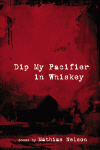Dip My Pacifier in Whiskey
When my copy of Dip My Pacifier in Whiskey arrived in the mail, I could not wait to get reading. I don’t tend to judge a book by its cover, but rather by its title. To me, it seemed like a play on the adult child, and it had been awhile since a title instantly hooked me. The book cover is black with red brush strokes, simple but still interesting. Unfortunately, I really struggled to find a solid sample of writing to lure readers to this book of poetry.
When my copy of Dip My Pacifier in Whiskey arrived in the mail, I could not wait to get reading. I don’t tend to judge a book by its cover, but rather by its title. To me, it seemed like a play on the adult child, and it had been awhile since a title instantly hooked me. The book cover is black with red brush strokes, simple but still interesting. Unfortunately, I really struggled to find a solid sample of writing to lure readers to this book of poetry.
One poem that I enjoyed from the collection is “My Mother.” Ranging from two to four lines, each stanza acts as a description of the narrator’s mother. Though each stanza stands alone, they add to each other, building our image of this woman:
A warm
makeup smeared telephone
dial tone.
Self-help
anxiety cassettes
fast-forwarding.
Pills rattling
in the vents.
I thought that most of the descriptions were interesting and that it was a fresh approach to a descriptive poem. There are no other characters, no other distractions. I enjoyed getting to know the mother in this poem. No person or character is perfect, but their imperfections are what make them unique and individual.
However, I struggled with making sense out of the rest of the collection. A lot of passages were condescending to both family and strangers. There are great writers out there whose abrasiveness and cockiness stun the reader and manage to win them over (for example, Dave Eggers); however, Nelson failed to hit that mark for me. In his poem “Thin Sliced, Moist Ham,” the descriptions and events didn’t read as reliable. I did not trust the lines; I felt like they were trying to deceive me, trick me. The poem details the narrator’s interactions with a homeless person, or “bum” as Nelson writes. The narrator admits that he gives money to this man when he goes drinking in the city. They are shown outside of a sandwich shop, waiting for scraps. The homeless person tells the narrator not to look at the bite marks because he will imagine the “fat fingers, dirty nails, bad breath, yellow teeth.” It doesn’t seem entirely realistic to me that someone who is literally starving would be concerned with the “fat fingers” of the person who had originally purchased the sandwich. The homeless person tells the narrator to instead
picture a beautiful blonde college girl,
tongue pink as her innards,
lips juicy as the tomato, then
it’s not so bad
being a bum it’s beautiful!
Being a bum is not beautiful. If the writer was trying to create a play on beauty, it did not succeed for me. If you are going to poke fun at something as serious as being homeless, you need to commit 100% and make it so effective that the reader cannot fault you for being insensitive. The description of a tongue being pink like someone’s innards is awkward and takes away from the image of beauty. The last two lines ending in an exclamation point seemed kind of ludicrous. I cannot think of one instance or hypothetical situation where being homeless is beautiful.
Several themes ran through the book during my reading. The writer clearly struggles with his identity in the family and how his writing will affect his relationships after it is published; he frequently addressed this concern in his poetry. The book read like an autobiography, but it wasn’t about someone well-known or unique. The narrator is a middle-aged boy/man who lives with his parents and has yet to find his place in the world. His brother went through a divorce and has a son with autism—the reader cannot forget this fact as the writer reminds us every single time the son is brought up. I can’t even remember his name because with every mention, the reader is reminded, writer’s brother’s son = autism. As a reader, this seems like an interesting and small detail; I wanted to get to know this family. I wanted to get to know his brother outside of his broken marriage and pain, and I wanted to get to know his son outside of his diagnosis. Writing a book of poems about your family is such an interesting concept, as so much poetry is autobiographical about the writer, specifically. But including all these other people would have been very interesting, had I gotten to know them better.





